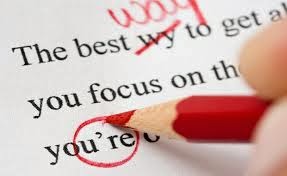Use of 'single' and "double" quotations
I grew up always using “double” quotation marks but
Australia generally follows England’s lead rather than America’s when it comes
to grammar and spelling. So these days, there is a partiality for ‘single’
quotation marks. Universities can vary with this however so it’s worth checking
but I would air on the side of caution and go with single quotes. Using a quote
within a quote though, calls for “double” quotation marks. For example, ‘Frank
told me he didn't want to come by, he said he was “too busy” to hang out doing
nothing with me’. I also feel that many double quotes can change the
readability of something, making it too busy and dense. Other rules around
quotation marks are where to place punctuation…before or after the quote mark?
It depends whether the punctuation is part of the sentence within the quote,
for instance, using a question mark, ‘Is it today you fly to Adelaide?’
demonstrates that the punctuation is part of the question, rather than ‘I asked
you if you would be flying to Adelaide today’?
Capitalisation
Capital letters are also on the decline, making reading less
full on and top heavy. The main rules apply naturally in terms of proper nouns,
the first word in a sentence but in a heading for example, it is no longer
imperative to capitalise every first letter of every word and we certainly
don’t capitalise conjunctions like and, in, the, of, or others. For example, a
heading is just fine being, ‘Proofreading and editing service’ rather than ‘Proofreading
and Editing Service’. Only the first word and proper nouns need to be
capitalised, such as ‘Proofreading and editing service in Brisbane’. Always
make ‘I’ a capital no matter what. It is also a proper noun so the rule
applies. Historical events like World War One, and in acronyms even if there
are no capitals when spelled out like PTO, (please turn over). Mum and Dad can
be tricky but when I'm talking about my dad I use a lower case d. When I say ‘Hi
Dad, come over for dinner’ it’s a capital D.
Fonts
There are a plethora of fonts available now and it is so
tempting to try many of them. Trust me, this looks ridiculous and
unprofessional on any page and comic sans
should be banned. Over used and made for comics…nothing else. The truth is some
fonts work better for hard copies and some for reading on a screen although web
fonts have certainly moved away from the web-safe Verdana, San Serif, Arial and
Georgia fonts. Some
fonts look pretty but are incredibly difficult to read, and some you
would simply
get tired of . I think if you are scribing something that was supposed
to be brief and written by a child then this would be fun and for blogs
perhaps and they can give a web page a real personality but they need to be
assessed properly, fitting browsers, the style of page and platform used. A
serious website about a legal practice for example would look ludicrous and
unprofessional being done up in a preposterous font. Keep in mind
that many institutions have strict rules about fonts such as Times New Roman 12
point, 1.5 space in between. There is no deviating.







